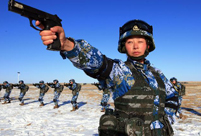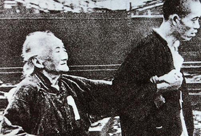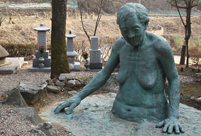 Martenitsa adds glamour to Bulgarian Embassy
Martenitsa adds glamour to Bulgarian Embassy
 Mysterious 'Dolan Tribe' in Xinjiang
Mysterious 'Dolan Tribe' in Xinjiang
 This is Shanghai
This is Shanghai
 Female attendants serving 'two sessions'
Female attendants serving 'two sessions'
 The many tears of DiCaprio
The many tears of DiCaprio
 Dan Dan's bittersweet opera life
Dan Dan's bittersweet opera life
 A dream wedding for a girl suffering from cancer
A dream wedding for a girl suffering from cancer
 Old photos of Anti-Japanese War (1937-1945)
Old photos of Anti-Japanese War (1937-1945)
 This is Beijing – Nanluoguxiang
This is Beijing – Nanluoguxiang
SEOUL, March 7 -- Deposits denominated in the Chinese yuan rose more than 20 times over the past six months in South Korea as local financial institutions raised yuan deposits for arbitrage trading, central bank data showed Friday.
Yuan deposits reached 7.62 billion U.S. dollars as of the end of February, up from 310 million dollars at the end of August last year, according to the Bank of Korea (BOK).
The surge came after financial institutions increased arbitrage trading by converting the South Korean currency into the Chinese yuan to gain interest rate differentials amid expectations for the yuan's appreciation against the dollar.
After the forward yuan/dollar exchange rate fell, local currency traders converted the won funds into the dollar in the won/dollar currency swap market, before changing the dollar funds into the yuan in Hong Kong's yuan/dollar currency swap market, according to a BOK official.
Expectations for the Chinese yuan's ascent to the greenback lowered borrowing costs in Hong Kong through the yuan/dollar currency swap market, driving local institutions to deposit yuan funds earned in Hong Kong into yuan deposit accounts in South Korea.
Amid excessive arbitrage trading with currencies of South Korea and China, the Financial Supervisory Service (FSS), South Korea's financial watchdog, have instructed financial institutions to refrain from making such transactions.
Despite the guidance, deposits denominated in foreign currencies hit a new record high of 52.68 billion dollars as of end-February, up 3.42 billion dollars from a year earlier.
The dollar deposits expanded 2.99 billion dollars from a month earlier to 39.68 billion dollars as of end-February, while the yuan deposits inched up 60 million dollars last month.
The BOK said in a statement that the dollar deposits increased due to a rise in corporate deposits for exports and imports as well as a gain in deposits into local branches of Chinese banks by local institutions such as brokerages and insurers.
"As local branches of Chinese banks offer higher deposit rates on dollar funds, local institutions sought to swap the won funds into the dollar funds, which was deposited in Chinese banks," the BOK official said over phone.
Banks in South Korea offer an annualized interest rate of 0.2-0. 3 percent for the three-month, won-denominated time deposits. Local branches of Chinese banks pay more than 1 percent for the same-maturity dollar funds.
If financial institutions convert the won funds into the dollar in the currency swap market and put them into the dollar accounts of Chinese banks, local institutions can get a return of more than 3 percent due to the won/dollar swap rate of around 2 percent.
Retail deposits denominated in the dollar ranked first in terms of deposit size with 39.68 billion dollars at the end of February, which accounted for 75.3 percent of the total. It was trailed by yuan deposits with 7.62 billion dollars, the Japanese yen with 2. 41 billion dollars and the European single currency with 2.03 billion dollars.
The deposits refer to those held by local residents, foreigners staying here for more than six months and foreign companies.
South Korea sought to reach currency swap deals with many countries as part of efforts to reduce its dependence on the dollar for trade settlements.
South Korea has signed currency swap agreements worth around 129 billion dollars, with those with China, Japan, United Arab Emirates, Malaysia and Australia amounting to 56 billion dollars, 10 billion dollars, 5.4 billion dollars, 4.7 billion dollars and 4. 5 billion dollars, respectively.
South Korean Finance Minister Hyun Oh-seok said Thursday that Seoul has a positive view on opening a foreign exchange market where currencies of South Korea and China are bought and sold directly.
Under the three-year economic innovation plan, the Finance Ministry planned to lay grounds for such won-yuan market as part of efforts to develop the country's foreign exchange market.
In 1997, South Korea launched the won-yen direct transaction market where currencies of South Korea and Japan are traded, but it was closed just a few months later due to lack of demand.
 Chaihe village, pure and peaceful fairyland in snow
Chaihe village, pure and peaceful fairyland in snow Belgians warmly welcome arrival of China's giant pandas
Belgians warmly welcome arrival of China's giant pandas Female marines receive tactical training in NW China
Female marines receive tactical training in NW China Blood memory: Nanjing Massacre in 1937
Blood memory: Nanjing Massacre in 1937 Top 10 pure beauties in showbiz
Top 10 pure beauties in showbiz British WWII veteran: I can't forgive Japan
British WWII veteran: I can't forgive Japan Tongban's dream of prosperity
Tongban's dream of prosperity Chinese frigate Yancheng holds drills in Mediterranean Sea
Chinese frigate Yancheng holds drills in Mediterranean Sea A visit to comfort woman's home in South Korea
A visit to comfort woman's home in South Korea Fairyland? Qingdao in sea of clouds
Fairyland? Qingdao in sea of clouds Top 10 most handsome faces in Asia in 2013
Top 10 most handsome faces in Asia in 2013 Female celebs with beautiful long legs
Female celebs with beautiful long legs Cat 'guardians' in Forbidden City
Cat 'guardians' in Forbidden City Large numbers of ancient coins excavated in Inner Mongolia
Large numbers of ancient coins excavated in Inner Mongolia Leisurely life beneath Zhonggulou, where time travels slower
Leisurely life beneath Zhonggulou, where time travels slowerDay|Week|Month